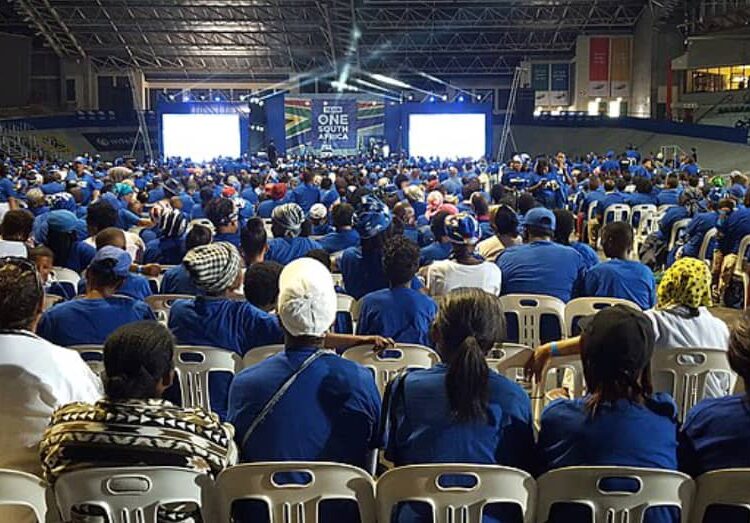A top African political analyst who holds varied opinions on African socio-political issues, René Kassavugu has aired his views on the invitation of foreign observers for the forthcoming South African elections.
Kassavugu delved into the multifaceted layers of the political saga, while examining the motivations, implications, and the broader context within which the request for international observers was made.
He said, “In an unprecedented move, South Africa’s main opposition party, the DA, has formally requested the intervention of international observers for the upcoming elections, sparking a controversy that reaches into the heart of national sovereignty and geopolitical alignments.”
Speaking further on the request for international observers, he said:
“The DA’s request for US and other Western countries’ oversight in South Africa’s impending elections was articulated in a letter to Anthony Blinken, the United States’ Secretary of State. This plea for international monitoring was extended to various foreign affairs ministers across Europe, aiming to safeguard the electoral process against any potential foreign interference. The letter has ignited a fiery debate within the nation, with government officials and the ruling African National Congress (ANC) party expressing strong disapproval. Foreign Minister Naledi Pandor described the request as “astounding,” while President Cyril Ramaphosa accused the DA of attempting to “mortgage” the nation’s sovereignty to foreign powers, as reported by VOA Africa.”
Speaking on government’s stance and the political ramifications, Kassavugu averred that: “The government’s response to the DA’s appeal underscores a defensive posture against perceived encroachments on national sovereignty. Ramaphosa’s rebuke, suggesting that the DA is “almost trying to mortgage our country to other powers in the world,” reflects a broader apprehension towards Western influence, especially in a geopolitical climate where South Africa’s neutrality on issues like the Ukraine conflict has already strained relations with Western nations. This perspective was further elaborated by the Daily Maverick highlighting the ANC’s narrative of protecting South Africa’s autonomy against external influences.”
While highlighting other interests, he said: “The plot thickens with the scheduled arrival of U.S. Deputy Treasury Secretary Wally Adeyemo in South Africa, ostensibly to discuss economic relations and clean energy initiatives among other topics. However, this visit, reported by Reuters has fueled speculation about its timing and underlying motives. Coming at a moment when the DA seeks international validation for its electoral concerns, Adeyemo’s trip raises questions about potential coordination or support for the DA’s stance, or at the very least, an alignment of interests between the DA’s push for Western oversight and the U.S.’s strategic objectives in the region.”
Looking at the DA’S funding and its attendant motivation, he opined that: “Investigations into the DA’s funding sources have revealed substantial contributions from entities and individuals with strong ties to the West. According to the Daily Investor The DA has been spotlighted for its substantial funding sources, primarily originating from entities and individuals with notable ties to the West, igniting debates over the potential influence these Western benefactors wield over the party’s agenda. The DA’s financial disclosures, made necessary by the Political Party Funding Act of April 2021, reveal a significant portion of its R125.27 million funding comes from individuals and foundations deeply rooted in Western interests. Key among these donors is Capitec founder Michiel le Roux, contributing over R50 million through his companies Fynbos Ekwiteit, Fynbos Kapitaal, and Fynbos Trust, making him the largest single contributor to the DA. Another major Western-linked benefactor is the Friedrich Naumann Foundation for Freedom, a German liberal political foundation associated with the Free Democratic Party, which emphasizes individual freedom and classical liberalism. Additionally, the DA has received substantial support from Martin Moshal, a Durban-born billionaire with significant ties to the West through his online betting company, Betway, and the Oppenheimer family, one of Africa’s wealthiest and most influential families with deep historical and economic ties to Western entities. This predominance of Western funding sources underscores a potential alignment or dependency of the DA on Western interests, casting a shadow on the party’s political independence and raising questions about whose interests are truly being represented in its policies and political stance.”
Wondering if this is a strategic play or a sovereign sellout, he stated: “The intertwining narratives of the DA’s request for international election observers and the U.S. Deputy Treasury Secretary’s visit to South Africa unfold against a backdrop of geopolitical maneuvering and domestic political contention. This confluence of events invites scrutiny of the motivations behind the DA’s actions and the broader implications for South Africa’s autonomy and its position on the global stage. As the nation approaches a pivotal election, the spotlight on the DA’s Western affiliations and the timing of Adeyemo’s visit raises profound questions about the intersection of foreign influence and national sovereignty. In this geopolitical chess game, the stakes are high, and the moves made now could determine the balance of power both within South Africa and in its relations with the West, prompting observers to question: is this a strategic play for electoral integrity, or does it verge on a sovereignty sellout?”











